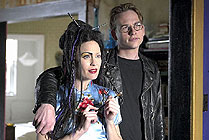|
|
|
|
A
Home at the End of the World
|
 |
|
It is a theme so beloved of cinema that it can easily become hackneyed: while youth is full of idealism and wide-open possibilities, middle and old-age entail disillusionment and a 'shrinking of the world'. Particularly when the ageing characters in question end up in suburbia. The Australian film Three Dollars (2005) bats this theme around, but it lacks the emotional force of Michael Mayer's debut feature, A Home at the End of the World. Adapted by Michael Cunningham (The Hours) from his 1990 novel, the story follows the paths of Bobby (Colin Farrell) and Jonathan (Dallas Roberts) from the gay experiments of their pubescence to the rather more difficult task of negotiating adult relationships. They eventually come to form an unusual trio with the free-living Clare (Robin Wright Penn), who longs to have a child. The film is about the redefinition of the concept of family. The sense of time (the '70s and '80s) and place (Ohio and New York) is crisply conveyed, especially via an excellent selection of pop songs on the soundtrack. On the downside, Mayer becomes a little squeamish when dealing with the nitty-gritty of progressive relationships, and Bobby is a rather too angelic figure to be entirely believable. But Mayer's evident rapport with the actors (he comes from theatre) shines through the occasional lumpiness of the material. Blessed with only a handful of scenes, Sissy Spacek as Jonathan's mother is a soulful presence – the moment when she begs Bobby to squeeze her until her bones break is superb. A Home at the End of the World has taken some hard knocks from reviewers, but it is worth seeing in the context of other contemporaneous films about changing personal relationships, including The Edukators (2004), We Don't Live Here Anymore (2004), Head in the Clouds (2004) and the Australian production Peaches (2005). All these movies are about a Lost Paradise located somewhere in their characters' past. But only Mayer and Cunningham hold on to the hope that growing up does not have to mean settling for less. © Adrian Martin May 2005 |
![]()